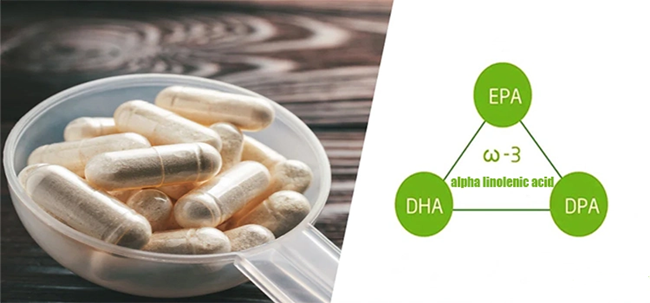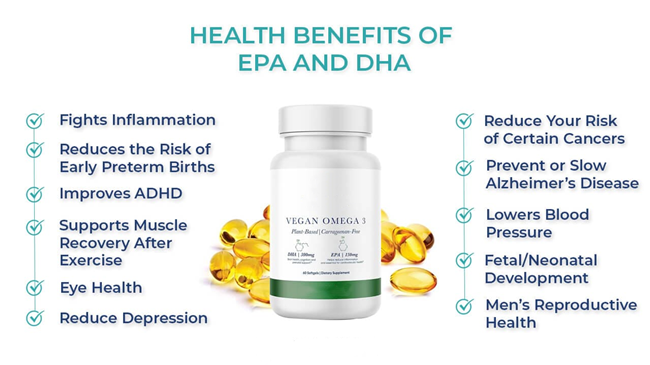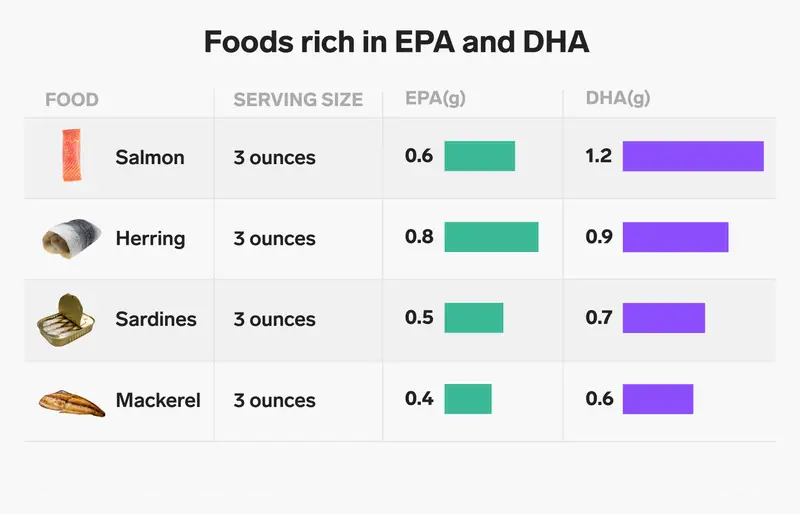Understanding EPA and DHA: Essential Nutrients for Your Health
In the realm of nutrition and wellness, EPA (eicosapentaenoic acid) and DHA (docosahexaenoic acid) have gained considerable attention for their numerous health benefits. Found primarily in fatty fish and certain algae, these omega-3 fatty acids play crucial roles in supporting various bodily functions. This article explores the importance of EPA and DHA from multiple perspectives, helping you grasp their significance and make informed choices about their incorporation into your diet.
1. Introduction to EPA and DHA
EPA and DHA are long-chain omega-3 fatty acids, classified as essential because our bodies cannot produce them efficiently. They are predominantly sourced from marine sources like fish and algae, making them vital components of a balanced diet. Both EPA and DHA serve as fundamental building blocks for cell membranes throughout the body, influencing membrane fluidity and function.
2. Health Benefits of EPA
-
Anti-inflammatory Properties: EPA is known for its potent anti-inflammatory effects. It helps to reduce inflammation in the body by competing with arachidonic acid (an omega-6 fatty acid) for enzymatic conversion, leading to the production of less inflammatory molecules like prostaglandins and leukotrienes.
-
Cardiovascular Health: EPA plays a crucial role in maintaining heart health. It helps to lower triglyceride levels in the blood, which is beneficial for reducing the risk of heart disease. EPA also supports healthy blood vessel function by improving endothelial function and reducing arterial stiffness.
-
Mood and Mental Health: There is evidence suggesting that EPA can have positive effects on mood and mental health. It may help alleviate symptoms of depression and anxiety, possibly by influencing neurotransmitter function and reducing inflammation in the brain.
-
Joint Health: EPA can be beneficial for joint health, particularly in conditions like rheumatoid arthritis. Its anti-inflammatory properties may help reduce joint pain and stiffness by decreasing inflammatory cytokines in the joints.
-
Skin Health: Omega-3 fatty acids, including EPA, contribute to maintaining healthy skin by supporting the skin barrier function and reducing inflammation that can lead to conditions like acne and psoriasis.
-
Eye Health: EPA, along with DHA (another omega-3 fatty acid), is important for maintaining eye health. It contributes to the structural integrity of the retina and may help reduce the risk of age-related macular degeneration.
-
Immune System Support: EPA helps regulate immune function by influencing the production of cytokines and other immune response molecules. This modulation of the immune system contributes to overall health and may help in managing autoimmune conditions.
-
Cognitive Function: While DHA is more closely associated with cognitive function and brain health, EPA also plays a role in supporting cognitive function, particularly in conjunction with DHA. Together, they contribute to maintaining brain structure and function throughout life.
Moreover, EPA plays a pivotal role in cardiovascular health by supporting optimal triglyceride levels and promoting healthy blood vessel function. Studies suggest that EPA supplementation may help reduce blood pressure and improve arterial elasticity, contributing to overall cardiovascular well-being.
3. DHA: Cognitive and Brain Health
DHA is highly concentrated in the brain and retina, emphasizing its critical role in cognitive function and visual acuity. During fetal development and infancy, DHA is essential for the formation of the brain and nervous system, influencing cognitive development, memory, and learning ability. Adequate DHA intake during pregnancy and early childhood is crucial for optimal brain development and may offer long-term cognitive benefits.
In adults, DHA continues to support cognitive function by preserving neuronal integrity and promoting neuroplasticity. Research suggests that DHA supplementation may help reduce the risk of age-related cognitive decline and neurodegenerative disorders such as Alzheimer's disease.
4. EPA and DHA for Heart Health
Both EPA and DHA contribute significantly to cardiovascular health by reducing triglyceride levels, improving blood vessel function, and exerting anti-inflammatory effects. The American Heart Association recommends consuming fish rich in EPA and DHA at least twice a week to lower the risk of coronary heart disease and stroke. For individuals who do not consume enough fish, supplementation with EPA and DHA-rich fish oil capsules can be a beneficial alternative.
EPA for Heart Health:
-
Triglyceride Reduction: EPA is particularly effective at lowering elevated triglyceride levels in the blood. High triglycerides are a risk factor for cardiovascular disease, and EPA helps reduce their production and increase their clearance from the bloodstream.
-
Anti-inflammatory Effects: EPA has strong anti-inflammatory properties. Chronic inflammation is linked to the development and progression of cardiovascular diseases such as atherosclerosis (hardening of the arteries). By reducing inflammation, EPA helps maintain the health of blood vessels and reduces the risk of plaque buildup.
-
Blood Pressure Regulation: Studies suggest that EPA may help lower blood pressure, especially in individuals with hypertension. It promotes vasodilation (widening of blood vessels), which improves blood flow and reduces strain on the heart.
-
Heart Rhythm Regulation: EPA has shown benefits in stabilizing heart rhythms, particularly in individuals with arrhythmias or irregular heartbeats. This effect can help reduce the risk of sudden cardiac events.
DHA for Heart Health:
-
Heart Rate Regulation: DHA plays a role in regulating heart rate and maintaining normal heart rhythm. This is crucial for overall cardiovascular function and reducing the risk of arrhythmias.
-
Blood Pressure Management: DHA, similar to EPA, can help lower blood pressure by improving endothelial function and reducing arterial stiffness. Both factors contribute to better cardiovascular health.
-
Cholesterol Balance: While EPA is more effective at lowering triglycerides, DHA helps improve HDL (good cholesterol) levels. This balance is important for overall lipid profile management and reducing the risk of coronary artery disease.
Combined Benefits:
-
Synergistic Effects: EPA and DHA often work synergistically to provide comprehensive cardiovascular protection. Together, they help reduce inflammation, improve lipid profiles, regulate blood pressure, and maintain healthy heart rhythms.
-
Reduced Risk of Cardiovascular Events: Incorporating EPA and DHA into the diet through fatty fish consumption or supplements has been associated with a lower risk of cardiovascular events such as heart attacks and strokes.
5. Sources of EPA and DHA
EPA and DHA are primarily found in oily fish such as salmon, mackerel, and sardines. Vegetarian sources include certain types of algae, which are increasingly used in supplements for those following a plant-based diet or seeking a sustainable alternative to fish-derived omega-3s. When choosing fish oil supplements, opt for products that are molecularly distilled to ensure purity and free from contaminants like heavy metals.
6. Choosing the Right Supplement
When considering EPA and DHA supplementation, it's essential to select products that provide adequate amounts of these fatty acids without unnecessary additives. Look for supplements that specify the EPA and DHA content per serving, typically ranging from 500 mg to 1000 mg combined per capsule. Additionally, check for third-party certifications such as NSF International or USP to ensure quality and purity.
7. Conclusion
In conclusion, EPA and DHA are indispensable nutrients that offer a multitude of health benefits, from supporting cardiovascular health and reducing inflammation to enhancing cognitive function and brain development. Incorporating EPA and DHA into your daily diet through fish consumption or high-quality supplements can significantly contribute to your overall well-being. Whether you're looking to improve heart health, support cognitive function, or simply enhance your nutritional intake, EPA and DHA are valuable additions to consider.
Xi'an tgybio Biotech Co.,Ltd is omega-3 fish oil EPA and DHA Powder supplier, we can provide omega 3 EPA Fish oil capsules or DHA fish oil capsules. Our factory can supply OEM/ODM One-stop service, including customized packaging and labels. If you are interested, you can send e-mail to Rebecca@tgybio.com or WhatsAPP+8618802962783.
References:
- Mozaffarian D, Wu JHY. Omega-3 Fatty Acids and Cardiovascular Disease: Effects on Risk Factors, Molecular Pathways, and Clinical Events. J Am Coll Cardiol. 2011;58(20):2047-2067. doi:10.1016/j.jacc.2011.06.063.
- Swanson D, Block R, Mousa SA. Omega-3 Fatty Acids EPA and DHA: Health Benefits Throughout Life. Adv Nutr. 2012;3(1):1-7. doi:10.3945/an.111.000893.
- Kidd PM. Omega-3 DHA and EPA for cognition, behavior, and mood: clinical findings and structural-functional synergies with cell membrane phospholipids. Altern Med Rev. 2007;12(3):207-227.


